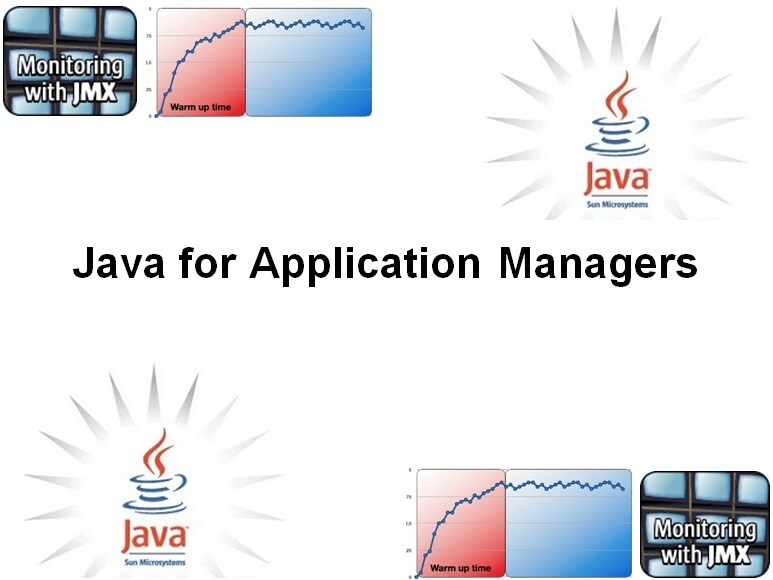-
Learning by doing
-
Trainers with practical experience
-
Classroom training
-
Detailed course material
-
Clear content description
-
Tailormade content possible
-
Training that proceeds
-
Small groups
In the course Java for Application Managers the foundations of the Java SE and EE platform, the Java language and the options to manage and monitor Java software are discussed.
The participants become familiar with Java applications and their data types, the object oriented nature of Java, the packaging of Java applications, the principles of garbage collection and the Java thread model.
A key module in the course treats the various logging mechanisms in Java software and the configuration of logging.
Also attention is paid to principles of exception handling in Java and how stack traces can be interpreted.
The Jakarta EE standard is discussed and attention is paid to Jakarta EE Web Components like servlets and JSP's. In this respect the reference implementation for Web Components Tomcat is treated.
The participants also become familiar with Java Management Extensions (JMX) as a standard and API for the (remote) management and monitoring of Java Applications. The principles of memory management in Java and the various options to configure garbage collection are discussed as well.
The final subject of the course is the performance monitoring and performance tuning of Java applications. Optional appendixes about Java Database Connectivity (JDBC) and the Java Messaging Service (JMS) are provided and will be discussed if this is the desire of the class.
The course Java for Application Managers is intended for persons responsible for the monitoring, management and troubleshooting of Java Applications and for other interested persons.
General basic knowledge of computer systems and software development. Programming experience is an advantage in following this course.
In this hands-on course the theory is treated by means of presentation slides and is interchanged with exercises. Demos are used to clarify the theory. The course material is in English. The course times are from 9.30 up and to 16.30.
Participants receive an official certificate Java for Application Managers after successful completion of the course.

Module 1 : Java Intro |
Module 2 : log4j Logging |
Module 3 : Stack Tracing |
|
Java Platform Java Editions Java Libraries Types of Java Applications Compiling and Running Programs Standalone Application structure Java Variables Primitive Data Types Classes and Objects Inheritance Casting Objects Packages Packaging in JAR files Garbage Collection Java Thread Model Thread Characteristics |
Logging in Java log4j characteristics log4j Basic Concepts java.util Logging Logging API Simple Logging Logging Configuration log4j properties Configuration Options Loggers Logger Output Hierarchy Inheriting Logging Levels Logger Names Log Levels Appenders Layouts |
Error Conditions Exceptions in Java Exception Handling Generated Stack Traces Finally Clause Exception information Predefined Exceptions Multiple catch clauses ArrayIndexOutOfBoundsException NullPointerExceptions ClassCastExceptions NumberFormat Exceptions Creating Exception Classes Throwing Exceptions Chained Exceptions Assertions |
Module 4 : Jakarta EE |
Module 5 : Java Management Extensions |
Module 6 : Memory Management |
| Jakarta EE Standard Jakarta EE Servers Servlets and JSP's Translation and Request Time EJB Components Jakarta EE API's Apache Tomcat Tomcat Directories Configuration Files Web Application Structure Deployment Descriptor Sessions Tomcat Logging |
What is JMX? JMX Goal Where is JMX used Managed Beans MBean flavors JMX Architecture Java SE Mbeans Naming MBeans MBean Server Registering Mbeans Manipulating MBeans Notifications Notification Listener |
JVM's Internal Architecture Heap and Stack Java Memory Management Object Lifecycle Strong Object References Invisible and Unreachable Circular References Tuning Garbage Collection Generational GC Heap Space Organization Tuning Garbage Collection GC Algorithms Finalization |
Module 7 : Java Performance Tuning |
Optional Appendix : JDBC |
Optional Appendix : JMS |
| Influences on Performance JIT Compilation Hotspot JVM Monitoring, Profiling, Tuning String Handling Buffered and New I/O Synchronization Collections Serialization Lazy Loading |
Java Database Connectivity (JDBC) JDBC Overall Architecture JDBC Operation JDBC Drivers Database URL's ClassNotFoundException Using Tomcat and JDBC Configuring JNDI JDBC Resources Context.xml in META-INF JDBC in Web Applications |
What is JMS? JMS Terminology JMS Programming Model Message Consumption Messaging Domains Queues Topics Message Types Message Headers Durable Subscriptions |
